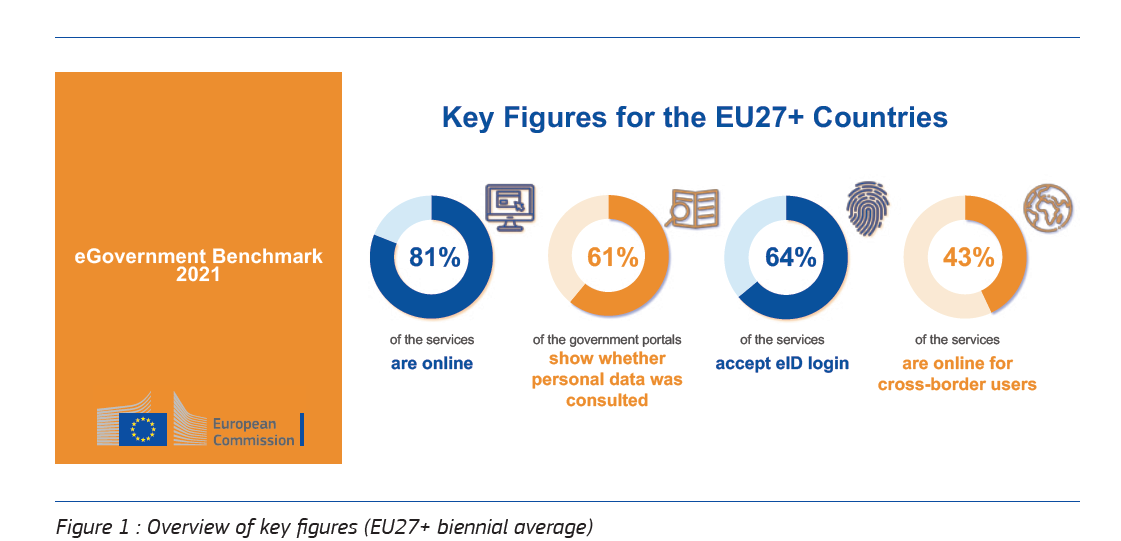Similar to what happened to businesses, the COVID-19 pandemic has also acted as a major accelerator in the digitization of government services, which have had to adapt and transform to adapt to the reality of restrictions and restrictions imposed in Europe since the beginning of 2020 Capgemini’s e-Government Standard 2021 shows that the pandemic has caused some disruptions but pressure It is also up to European governments to change, including in the way public services are delivered.
This is the 18th report submitted by the consulting firm to the European Commission, which indicates that Europe has entered a new era in e-government but that there is still a need for continuous investment and regulatory changes. It is a “thermometer” of the state of services to citizens and businesses that shows strengths, but also points to areas that need more investment and improvement, particularly in cross-border services, which are provided across Europe, and in transparency.
Credits: Capgemini
“data-title=” e-Government Standard 2021 – 99% of public services are connected to the Internet. Portugal rose in the ranking of the best e-government – SAPO Tek “> 
The analysis was conducted in partnership with IDC and Polytechnic of Milan and evaluated more than 7,000 web pages from 36 European countries, a group that goes beyond EU member states and includes Iceland, Norway, Switzerland, the United Kingdom, Albania, Montenegro, Macedonia, Serbia and Turkey.
81% of European public services are connected to the Internet. Portugal almost 100%
The epidemiological situation caused by COVID-19 demonstrated the need to migrate services from offline to online when face-to-face interactions were suspended and data for the 2021 edition of the study indicates that more than eight out of every ten public services assessed are now available online.
The document, which highlights the recorded development, notes that “in two years, public administrations put 23% more services online, helping to combat the economic losses associated with consecutive incarceration.”
Not only is the availability of online services assessed, but a set of four dimensions with 14 indicators, including citizen focus, transparency, technology enablers, and cross-border services. Overall, the countries analyzed in the report performed 68%, but Malta (96%) and Estonia (92%) stand out as the best performers, taking first and second places in this ranking. “Their governments are the most user focused, transparent, technological and open to users from other European countries,” says Capgemini.
In the list of the most capable are Denmark (85%), Finland (85%), Austria (84%), Iceland (84%), Luxembourg (84%), Portugal (82%), Latvia (82%), the Netherlands (82 %), Norway (81%) and Lithuania (81%). Portugal appears in eighth place with Latvia and the Netherlands, but it stands out in some specific areas, such as the 24/7 availability of online services.
Of all the countries analyzed, the report indicates that eight out of 10 government services can be completed online, with an average of 81%, but here Portugal, Malta and Denmark stand out with more than 98% availability.
In Portugal, the figure is higher, 99%, but the percentage of online services has not developed since 2020, when it was close to 100%, although the ranking in the area of user focus has improved to 98 points instead of 95.
Credits: Capgemini
“data-title=” e-Government Standard 2021 – 99% of public services are connected to the Internet. Portugal rose in the ranking of the best e-government – SAPO Tek “> 
“Portugal’s assessment is very positive,” says Felix Lopez, in charge of the public sector at Capgemini Portugal in Interview with SAPO TEK, highlighting the importance of being able to use almost all services online and also focusing on electronic identification, allowing operations to be carried out without having to physically go to the window.
The report also points to Portugal as a good example of ensuring online documentation. On the European average, 72% of services provide the ability to upload and obtain documents online, but Portugal, Denmark and Norway ensure their availability in 97% of cases, which saves time and avoids unnecessary paper printing.
There is also a positive sign in business services for Portugal, where there is a greater balance between corporate services and services to citizens, unlike in other countries where digitization has advanced more rapidly in business services.
The availability of a central information portal, ePortugal, is another positive reference, and Portugal is on the list of the eight distinguished countries in this field, with portals where citizens can start their journey and get information and services from various government regions.
You are Complete data from country report analysis It can be consulted online.
More usability and citizen participation
Although the report focuses on evaluating the services and not on their use, there is also a caveat to the fact that an increase in supply does not automatically mean an increase in usage, nor an increased level of satisfaction or inclusion.
Governments should strive to develop their digitization strategy with these three dimensions in mind. [utilização, satisfação e inclusão], to ensure that citizens realize the real and lasting value in e-government and that no one is left behind,” emphasizes Mark Reinhardt, Head of Public Sector and Health at Capgemini.
Felix Lopez also recalls that there is still a very large segment of the population in Portugal that does not have digital literacy, or has a low level of skills in this area, and that it is difficult to bring them into the digital landscape. “For many, it is easier to go to the store and see the person in person.”
For the person in charge of the public sector in Capgemini Portugal, it is necessary to focus more on the usability of applications, and focus on getting more people to the moment when portals and applications are designed. “We have to involve citizens in the project,” he says, advocating the need to experience and understand the difficulties.
The report also notes a significant difference between the digital maturity of central and local government services. 85% of all central services are connected to the Internet and this is only 59% of locations, with the most coherent journey considered beneficial to citizens.
Credits: Capgemini
“data-title=” e-Government Standard 2021 – 99% of public services are connected to the Internet. Portugal rose in the ranking of the best e-government – SAPO Tek “> 
Transparency and cross-border services are still underdeveloped
Despite the overall positive evaluation, the study points to some areas that need investment and improvements, namely transparency and cross-border services, but also the need to increase investment in adapting platforms for use in mobile phones and identification services such as eID.
The accessibility of services for citizens of other Member States in different countries has slowly developed and lags in other dimensions. The average rating is 55% and Capgemini says it would be easier to do business and ensure travel to Europe if there were more simplifications in this area. Citizens of other European countries can perform less than half of government services online.
Security and transparency are also rated less positively. Only 61% of government portals inform citizens about whether their personal data has been consulted, by whom or why it is being used. Capgemini argues that personal data solutions should be adopted more widely to give the user more control.
This is also the view of Velez Lopez, who in an interview with SAPO TEK revealed his concerns about this issue and cybersecurity. This year, none of the government websites passed all 14 security standards for the study, and only 2% prevented a series of cross-site scripting attacks and hacking.
NS The full report is available online on the Capgemini website..
Editor’s note: News has been updated with more information

“Wannabe internet buff. Future teen idol. Hardcore zombie guru. Gamer. Avid creator. Entrepreneur. Bacon ninja.”

